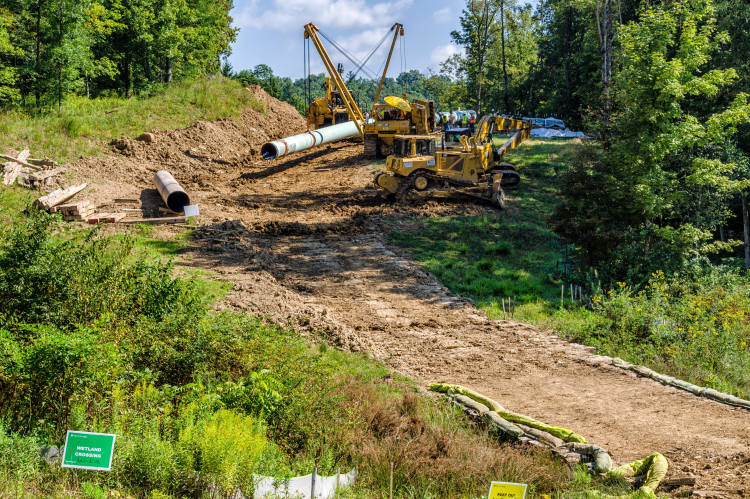Muddy Spring Near Mountain Valley Pipeline Raises More Concerns in Virginia Community

Muddy water erupted from the ground near a natural spring in Sinking Creek, Virginia, raising concerns about potential contamination from the construction of the Mountain Valley Pipeline (MVP).
The incident occurred roughly half a mile from where crews are working on the pipeline, which burrows under the Blue Grass Trail and Greenbrier Branch before climbing a mountainside. While the source of the muddy runoff remains unclear, residents and environmental groups suspect it originated from the pipeline work.
This incident is the latest in a string of issues plaguing the controversial project. Opponents, including 29 community and statewide organizations, have called on the Virginia Department of Environmental Quality (DEQ) to halt construction, citing numerous violations of erosion and sediment control regulations.
The unique karst topography in the area, characterized by sinkholes and caverns, may have facilitated the underground travel of sediment-laden water to the spring, which feeds into Sinking Creek.
"We knew it was going to be a disaster of some kind, somewhere, " Donna Pitt, a local resident and pipeline opponent, stated, expressing her frustration.
Drinking water contamination has been reported in at least two homes reliant on wells or springs, and sediment plumes have been observed downstream.
Perry Martin, a Giles County Board of Supervisors member, also expressed his concern in an email to DEQ, highlighting the unusual amount of mud in the stream.
While DEQ has yet to respond to the stop-work request, Mountain Valley acknowledges the problem and is "actively addressing the situation," according to spokeswoman Natalie Cox. However, they haven't explicitly confirmed the pipeline as the source.
Current efforts include pumping water from the spring and deploying a floating dam in Sinking Creek to capture sediment. Heavy rainfall in January may have contributed to the erosion issues, though Mountain Valley maintains that completing construction remains the best long-term solution for environmental protection.
Environmental groups, including Wild Virginia and Protect Our Water, Heritage, Rights, have repeatedly urged DEQ to halt construction until compliance with state standards is demonstrated.
They argue that DEQ has been "timid" in addressing problems and point to the 17-page letter detailing numerous instances of sediment entering waterways along the pipeline route.
FERC, which also monitors the project, reported 32 cases of sediment runoff from the construction site in recent weeks, though none were considered non-compliant.
However, the letter argues that these incidents highlight the potential for significant environmental impact if construction continues at its current pace.
Sedimentation, a common form of water pollution, can harm wildlife, clog waterways, and increase water treatment costs. The letter emphasizes that existing problems won't be addressed if MVP is allowed to proceed without addressing these environmental concerns.
The incident in Sinking Creek underscores the ongoing debate surrounding the Mountain Valley Pipeline and its potential impact on the environment and local communities.
As construction nears completion, questions remain about the project's long-term consequences and the effectiveness of current regulations in mitigating environmental risks.
Mountain Valley aims to have the pipeline operational by late March, supplying natural gas to East Coast markets.

